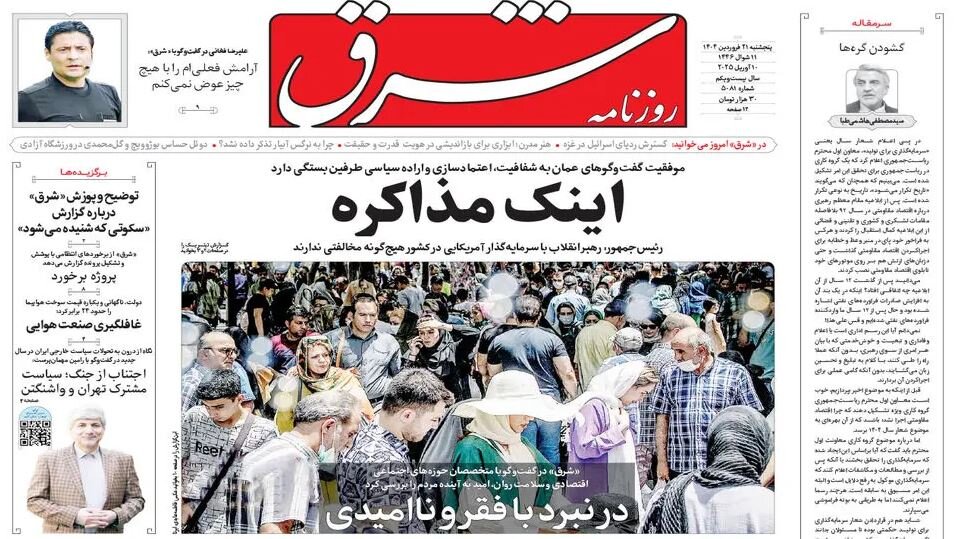Tehran – In a memo, Sharg discusses Abbas Araguc’s article in the Washington Post, writing: This article can be viewed as an intelligent attempt to explain the logic of the Islamic Republic of Iran in the current complex situation.
On the one hand, the text represents Tehran’s preparation to enter into dialogue based on mutual respect, while on the other hand it realistically and simply cites why Iran is deeply suspicious and distrustful of the US’s true intentions. The key point is to emphasize the principle that Iran pursues diplomacy not from weakness but from a position of strength and rationality. In the nuclear dimension, Araguchi, citing an assessment by the Western intelligence agency, emphasizes that Iran is not only seeking nuclear weapons, but still maintaining its commitment under the JCPOA. Finally, Araghchi intellectually places the ball in the Washington courthouse, saying that the path to engagement is open, but conditional on changes in American language and behavior. Iran’s Islamic Republic is confident in the strength of its people and pursues a policy of peace, but in the face of pressure and imposing, it remains united and powerful.
Jam-e-Jam: Negotiation with the West, look east
About two weeks ago, Iran responded to Trump’s letter and announced that it would accept a US negotiation proposal on three terms. One is indirect, and the other is that the mediator of this type of negotiation is Oman, not the UAE, and these negotiations are at a high level, and the US received little immediate resistance. Contrary to Western political and media narratives, it is the United States who are keen to negotiate such negotiations. If the US had opposed any of these terms, negotiations would have been postponed because Iran had little negotiation. Accepting the Iranian situation shows that Trump was eager to negotiate as soon as possible. We must make serious changes to our diplomatic strategy. In a situation where the US is aware of China’s growth potential and India, “looking the east” shows that Europe is turning to a strategic trade agreement with India as Europe may even coordinate its future direction towards China as it seeks to respond to Trump.
sobh-e-no: Muscat negotiations
In his commentary on the negotiations between Iran and the US, Sobh-e-no wrote: Some domestic media initially called Trump’s statement a propaganda campaign, but the news was confirmed by Iranian officials a few hours later, and it was said that indirect negotiations would take place in Muscat on Saturday (April 12th). Iran is planning to go to the negotiation table because Trump was trying to make Iran appear “anti-negotiable and anti-diplomacy.” But it is Trump’s actions, contradictory statements and policy changes that uncertain the fate of these negotiations. Tehran still has Trump’s pessimistic view of his past actions. Therefore, Iran’s main goal to participate in the negotiations is to examine America’s true intentions on the nuclear issue. Now we need to wait to see if the Trump team is serious and in good faith negotiating and whether it will secure Iran’s interests. Of course, presenting initiatives and acting intelligently and skillfully in negotiations is also effective in achieving results.
Arman-e-Melli: Society seeks peace, not war
Arman-e-Melli interviewed reformist political activist Dr Zahra Nejad Bahram about Saturday’s nuclear talks between Iran and the United States in Oman. She said: Iran and the United States have concluded to resolve their problems through negotiations. This is a positive development and negotiations are welcomed by people. Under the current situation, the country’s issues are so complicated that we can’t expect to move forward to lifting sanctions in a single negotiation. However, the issue of resolving tensions and being involved in dialogue was a demand for people, and therefore we observed that society and the economy reacted positively after it was announced that Iran and the United States would negotiate. Another thing is that Araguchi was involved in the JCPOA negotiations and was one of our (primary) negotiators. For this reason, he fully understands the details of the JCPOA negotiations and the challenges facing the country, and in the current situation he is considered the best negotiator for a meeting with the US.

